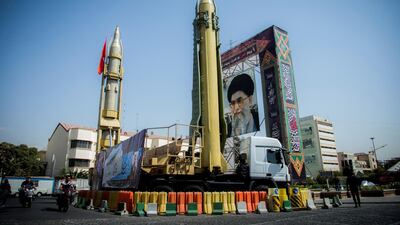Iran will try to unify its currency starting on Tuesday and control sales of the dollar in a bid to stem a record decline in the rial’s value on the unregulated market.
The government will sell the US dollar at a rate of 42,000 rials to all individuals and businesses, Iran's First Vice President Eshaq Jahangiri said, adding that enemies of the Islamic Republic and of the government were behind the instability.
Mr Jahangiri said the move will effectively unify Iran’s currency, which has been trading in a two-tier system for several years. The Central Bank of Iran controls an official rate for business traders and companies, and the unregulated market of commercial, high street currency vendors and unlicensed dealers has used a higher rate.
Anyone found selling the dollar at rates higher than 42,000 rials “will be dealt with severely” by judicial authorities and the police, Mr Jahangiri said.
“We do not officially recognise any other rate than this one,” he said. “From tomorrow, any other price that’s offered in the market will be considered contraband, in the same way that illegal drugs are contraband.”
The rial slid to a record low of 60,000 against the dollar on the unregulated market, according to Tasnim News agency. Mr Jahangiri said the sudden decline was “unnatural and unprecedented” because tens of billions of dollars worth of foreign currency had flowed into Iran in recent weeks from the country’s export revenues and this showed that a wider political plot sought to discredit the government of President Hassan Rouhani and foment instability.
“It’s natural that our enemies and opponents, especially the Americans, after the nuclear deal was agreed and after Trump took office, have made great efforts to try and present Iran’s economy as turbulent and try to discourage anyone from working with Iran,” Mr Jahangiri said.
US President Donald Trump's government is nearing a critical decision on its participation in Iran's nuclear deal, and political feuding at home raises pressure on Mr Rouhani to deliver a stronger economy for ordinary Iranians. Traders have also been accused of driving the currency lower with speculative bets.
Many businesses were forced to halt work amid the uncertainty created over prices and the availability of imported materials.
“After speaking to my usual printer, I’ve had to cancel a project because they weren’t selling anything,” said Payam, a 38-year-old in Tehran who owns a small advertising and publishing company. “I was also planning to advertise for new personnel on Saturday – I’ve also cancelled that plan now.”

